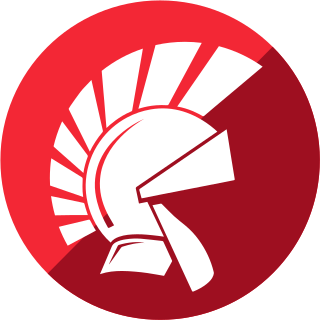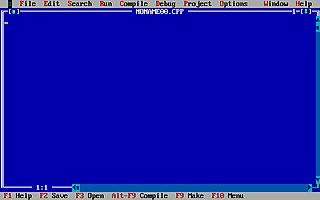Borland Software Corporation was a computer technology company founded in 1983 by Niels Jensen, Ole Henriksen, Mogens Glad and Philippe Kahn. Its main business was the development and sale of software development and software deployment products. Borland was first headquartered in Scotts Valley, California, then in Cupertino, California and then in Austin, Texas. In 2009 the company became a full subsidiary of the British firm Micro Focus International plc.

Pascal is an imperative and procedural programming language, designed by Niklaus Wirth as a small, efficient language intended to encourage good programming practices using structured programming and data structuring. It is named in honour of the French mathematician, philosopher and physicist Blaise Pascal.
Turbo Pascal is a software development system that includes a compiler and an integrated development environment (IDE) for the Pascal programming language running on CP/M, CP/M-86, and DOS. It was originally developed by Anders Hejlsberg at Borland, and was notable for its extremely fast compilation. Turbo Pascal, and the later but similar Turbo C, made Borland a leader in PC-based development.
C++Builder is a rapid application development (RAD) environment, originally developed by Borland and as of 2009 owned by Embarcadero Technologies, for writing programs in the C++ programming language currently targeting Windows, iOS and for several releases, macOS and Android C++Builder combines the Visual Component Library and IDE written in Object Pascal with multiple C++ compilers. Most components developed in Delphi can be used in C++Builder with no or little modification, although the reverse is not true, but this constraint is valid only for source code. Binary code generated by Delphi can easily be linked to binary code generated by C++Builder and vice versa to generate an executable written in both Object Pascal and C++. With this approach, C++ can be called from Object Pascal and vice versa. Since both Delphi and C++ use the same back end linker, the debugger can single step from Delphi code into C++ transparently.
The Visual Component Library (VCL) is a visual component-based object-oriented framework for developing the user interface of Microsoft Windows applications. It is written in Object Pascal.

Delphi is a general-purpose programming language and a software product that uses the Delphi dialect of the Object Pascal programming language and provides an integrated development environment (IDE) for rapid application development of desktop, mobile, web, and console software, currently developed and maintained by Embarcadero Technologies.
Clarion is a commercial, proprietary, fourth-generation programming language (4GL), multi-paradigm, programming language and integrated development environment (IDE) from SoftVelocity used to program database applications. It is compatible with indexed sequential access method (ISAM), Structured Query Language (SQL), and ActiveX Data Objects (ADO) data access methods, reads and writes several flat file desktop database formats including ASCII, comma-separated values (CSV), DOS (binary), FoxPro, Clipper, dBase, and some relational databases via ODBC, Microsoft SQL Server, Sybase SQL Anywhere, and Oracle Database through the use of accelerated native database drivers, and XML, Clarion can be used to output to HTML, XML, plain text, and Portable Document Format (PDF), among others.
Object Pascal is an extension to the programming language Pascal that provides object-oriented programming (OOP) features such as classes and methods.

Free Pascal Compiler (FPC) is a compiler for the closely related programming-language dialects Pascal and Object Pascal. It is free software released under the GNU General Public License, with exception clauses that allow static linking against its runtime libraries and packages for any purpose in combination with any other software license.
Turbo Assembler is an assembler for software development published by Borland in 1989. It runs on and produces code for 16- or 32-bit x86 MS-DOS and compatible on Microsoft Windows. It can be used with Borland's other language products: Turbo Pascal, Turbo Basic, Turbo C, and Turbo C++. The Turbo Assembler package is bundled with Turbo Linker and is interoperable with Turbo Debugger.
Borland Kylix is a compiler and integrated development environment (IDE) formerly sold by Borland, but later discontinued. It is a Linux software development environment based on Borland Delphi and Borland C++ Builder, which runs under Microsoft Windows. Continuing Delphi's classical Greek theme, Kylix is the name for an ancient Greek drinking cup. The closest supported equivalent to Kylix is the free Lazarus IDE package, designed to be code-compatible with Delphi. As of 2010 the project has been resurrected in the form of Delphi cross compiler for Mac and Linux, as shown in the Embarcadero's Delphi and C++ Builder roadmap. As of September 2011 with Kylix discontinued the framework for cross-platform development by Embarcadero is FireMonkey.

Lazarus is a free cross-platform visual integrated development environment (IDE) for rapid application development (RAD) using the Free Pascal compiler. Its goal is to provide an easy-to-use development environment for programmers developing with the Object Pascal language, which is as close as possible to Delphi.

Turbo Vision is a character-mode text user interface framework included with Borland Pascal, Turbo Pascal, and Borland C++ circa 1990. It was used by Borland itself to write the integrated development environments (IDE) for these programming languages. By default, Turbo Vision applications replicate the look and feel of these IDEs, including edit controls, list boxes, check boxes, radio buttons and menus, all of which have built-in mouse support. Later it was deprecated in favor of Object Windows Library, the Win16 API, and the GUI tools of Borland Delphi.
The Visual Component Framework (VCF) is an abandoned open source project for development under Microsoft Windows and Apple Macintosh that is distributed under the BSD license. It is an advanced C++ application framework that makes it easier to produce GUI-based C++ applications. The framework is C++ design and has built in support for rapid application development. The framework is designed to be portable over multiple platforms and compilers.

Turbo C++ is a discontinued C++ compiler and integrated development environment originally from Borland. It was designed as a home and hobbyist counterpart for Borland C++. As the developer focused more on professional programming tools, later Turbo C++ products were made as scaled down versions of its professional compilers.
Borland C++ is a C and C++ IDE for MS-DOS and Microsoft Windows. It was the successor to Turbo C++ and included a better debugger, the Turbo Debugger, which was written in protected mode DOS.
Turbo Delphi is a discontinued integrated development environment (IDE), created by CodeGear, which was targeted towards student, amateur, individual professionals, and hobbyist programmers. It used the Delphi programming language, which is a dialect of Object Pascal.
Turbo Debugger (TD) is a machine-level debugger for DOS executables, intended mainly for debugging Borland Turbo Pascal, and later Turbo C programs, sold by Borland. It is a full-screen debugger displaying both Turbo Pascal or Turbo C source and corresponding assembly-language instructions, with powerful capabilities for setting breakpoints, watching the execution of instructions, monitoring machine registers, etc. Turbo Debugger can be used for programs not generated by Borland compilers, but without showing source statements; it is by no means the only debugger available for non-Borland executables, and not a significant general-purpose debugger.

Turbo51 is a compiler for the programming language Pascal, for the Intel MCS-51 (8051) family of microcontrollers. It features Borland Turbo Pascal 7 syntax, support for inline assembly code, source-level debugging, and optimizations, among others. The compiler is written in Object Pascal and produced with Delphi.
This page details the history of the programming language and software product Delphi.





